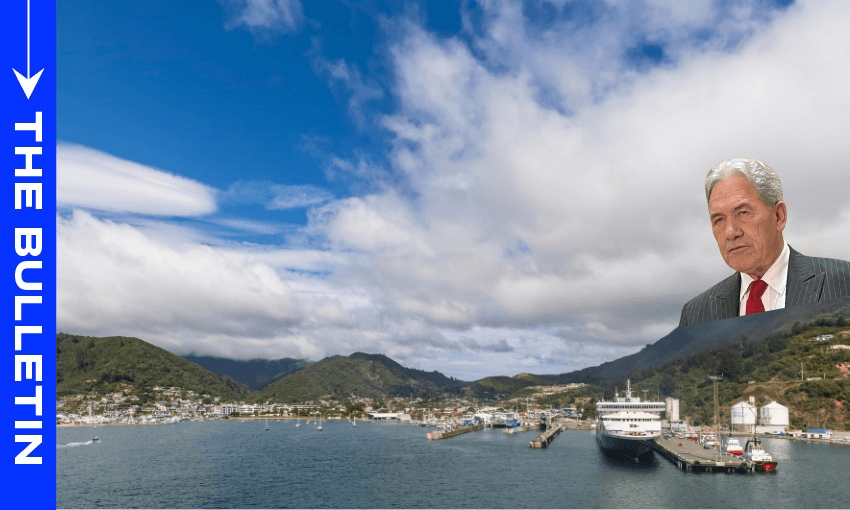The ferries will now be delivered in 2029, writes Alice Neville in today’s extract from The Bulletin.
To receive The Bulletin in full each weekday, sign up here.
‘Yes to affordability, no to extravagance’: Winston Peters unveils his ‘pragmatic’ ferry plan
After December’s anticlimactic announcement of an announcement, Winston Peters’ long-awaited March 31 update had to deliver something – and he did clear up one of the biggest question marks hanging over the whole saga: the two new ferries will be rail-enabled. Peters took control of the plan to procure replacements for the ageing Interislander fleet in December, a year after the incoming coalition cancelled the Labour government’s costly iReX project. Last year, cabinet failed to agree on a proposition to acquire two “rail-compatible” boats, as Thomas Manch reported for The Post. Peters was adamant the ferries had to be fully rail-enabled – a major point of contention that has delayed the coalition’s progress on the issue – and the newly appointed minister for rail was given until March 31 to develop a better plan.
Yesterday, Peters announced that design specifications for two 200m x 28m ferries (bigger than the current vessels but smaller than those coming under the Labour plan) had been selected and signed off by cabinet. Each ferry would have rail decks with capacity for 40 rail wagons, “given the efficiency of single shunt movements for multiple rail wagons for loading and unloading”, said Peters. Ferry Holdings Ltd, the company set up to procure the ferries, would now invite a shortlist of shipyards into a closed tender process, with a contract to be signed this year.
Ministerial advisory group’s plan rejected
The plan announced yesterday was not what was recommended by a Ministerial Advisory Group (Mag), which, as Georgina Campbell reported in the NZ Herald in December, paid $300,000 to advise the government on what to do. As Oliver Lewis reported (paywalled) for BusinessDesk last month, the Mag encouraged the government to approach a single shipyard and get a deal for two road-only ferries signed off by October 2024, meaning the ships would land by December 2027. “We did not accept that advice,” said Peters yesterday. “We believe in competitive tenders, and a full appreciation of what best serves our country. And road-only ferries came out as more expensive than buying road and rail ferries.” The ferries will now be delivered in 2029, which “will see the current fleet working right up to its use-by date”, as Tom Hunt and Thomas Manch reported for The Post.
The Mag’s concern with rail-enabled ferries was the extensive port infrastructure required to accommodate them. Peters said the shorter length of his boats and a “minimum viable and maximum reuse approach” would keep costs down – Picton’s marine infrastructure would be replaced, while Wellington’s would be modified and reused. Peters said the approach “contrasts sharply with the wanton demolition and extravagant specification under the cancelled project”. The terminal buildings would remain as is. “While some may regret the absence of a Taj Mahal in Picton and the Sydney Opera House in Wellington, the people paying their taxes will not,” said Peters.
Cost remains under wraps
The exact cost of the project remains under wraps, as revealing the budget would “turn a buyers’ market into a sellers’ market”, but Peters assured it would be “markedly cheaper” than the iReX project. He admitted the terminals would have to be upgraded eventually but expected the port companies to bear those costs, reported Fox Meyer for Newsroom.
The benefit of hindsight
Labour leader Chris Hipkins offered some qualified support for Peters’ new plan, reported Thomas Coughlan for the Herald. Peters brought the original proposal for two mega rail-enabled ferries to the table in 2018 when NZ First was in government with Labour, and cabinet signed off on a plan committing the government to cover their $551m price tag and the cost of replacing port infrastructure. “With the benefit of 2020 hindsight, accepting Winston Peters’ recommendation that we should go for two mega ferries in the first place probably wasn’t the wisest decision,” Hipkins told the Herald. “Two smaller ferries, which is where the government has landed now, might have been better from the outset – that wasn’t what Winston Peters recommended.”


